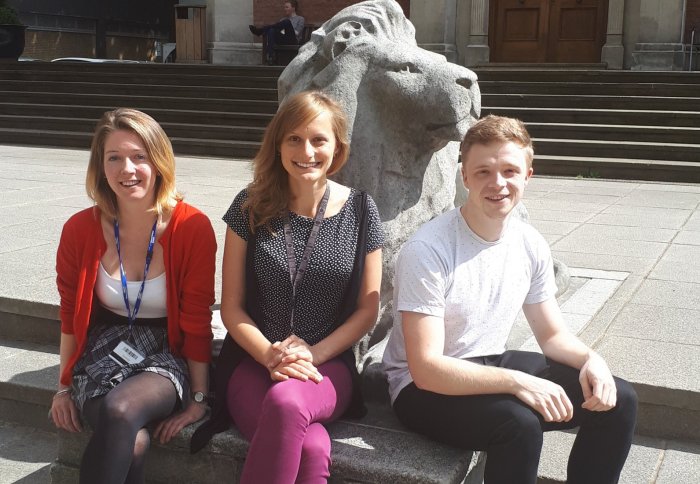EPSRC Doctoral Prize Fellowships

Left to right Lucy Wilson, Marketa Kubankova & Greg Craven
Greg Craven, Markéta Kubánková & Lucy Wilson awarded highly prized EPSRC Doctoral Prize Fellowships
EPSRC Doctoral Prize Fellowships are intended to help universities attract and retain the very best newly qualified PhDs that received EPSRC studentship funding and help them to launch a career in research. These highly prized fellowships have been awarded to Lucy Wilson, Markéta Kubánková and Greg Craven.
Markéta Kubánková received a degree in Biomedical Engineering at the Czech Technical University in Prague, before moving to Imperial College in 2013 to undertake a PhD in Chemical Physics. Her research in the group of Dr. Kuimova centers on developing and applying fluorescence-based approaches for investigating microscopic biological systems such as protein assemblies or living cells.
In the final year of her PhD, Markéta focused on developing a new technique termed ‘Rotor-based Organelle Viscosity Imaging’ (ROVI). In ROVI, small environment-sensitive fluorescent dyes called ‘molecular rotors’ are directed via active targeting to specific compartments of live cells for the dynamic measurement of microscopic viscosity, a critical parameter in cellular processes.
The EPSRC Doctoral Prize gives Markéta the opportunity to apply this new technique in fundamental studies of cell biology and to monitor disease-related changes of microviscosity.
Lucy Wilson completed her Master’s degree at Durham University before moving to Imperial College where she has just completed her PhD with the title of ‘Cyclic organometallic complexes for molecular electronics‘. This multi-disciplinary research was conducted under the supervision of Prof. Nicholas Long and Dr. Tim Albrecht, with the aim to synthesis molecular wires that include metal centres and complex structures to enable the study of conductance properties on a molecular scale.
Lucy’s EPSRC Doctoral Prize Fellowship will utilize the knowledge gained in her PhD and aim to develop new organometallic systems that can be studied for their use an electronically active materials.
Greg Craven moved to Imperial College London in 2013 to join the Institute for Chemical Biology, seeking to develop new research at the interface of chemistry and biology. His PhD focussed on generating new technologies to design better medicines for the treatment of cancer and was carried out under the supervision of Professor Alan Armstrong, Professor Ed Tate and Dr David Mann. Towards the end of his PhD, he discovered a new type of molecule that can stop the action of one of the key proteins involved in cancer. During Greg’s EPSRC Doctoral Prize Fellowship, he aims to improve the properties of this molecule so that it can be tested on cancer cells with the ultimate goal of turning it into a new medicine.
“Globally there is an urgent need for new medicines as many diseases still have inadequate treatments. The EPSRC Doctoral Prize Fellowship gives me the opportunity to develop the results of my PhD into something that will help to achieve this goal.”
Many congratulations to all three!
Article text (excluding photos or graphics) © Imperial College London.
Photos and graphics subject to third party copyright used with permission or © Imperial College London.
Reporter
Maria Tortelli
Department of Chemistry